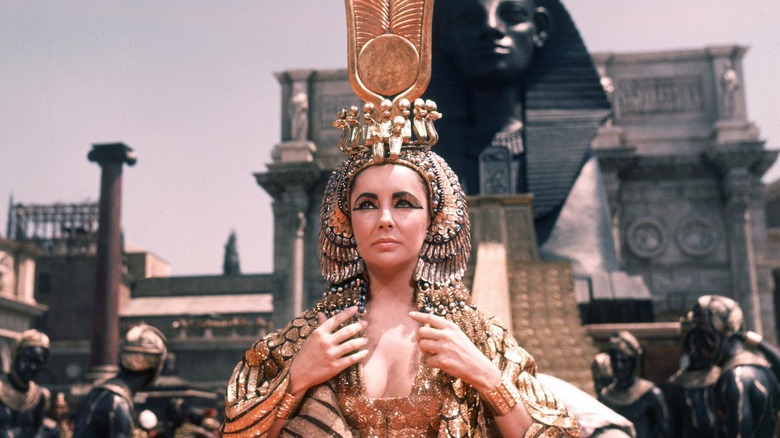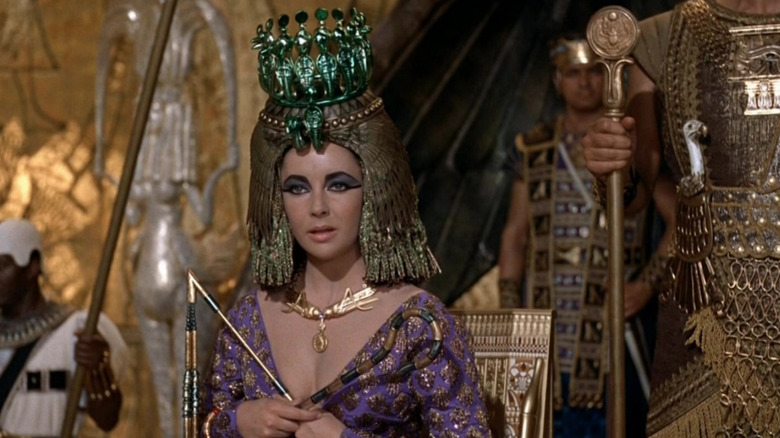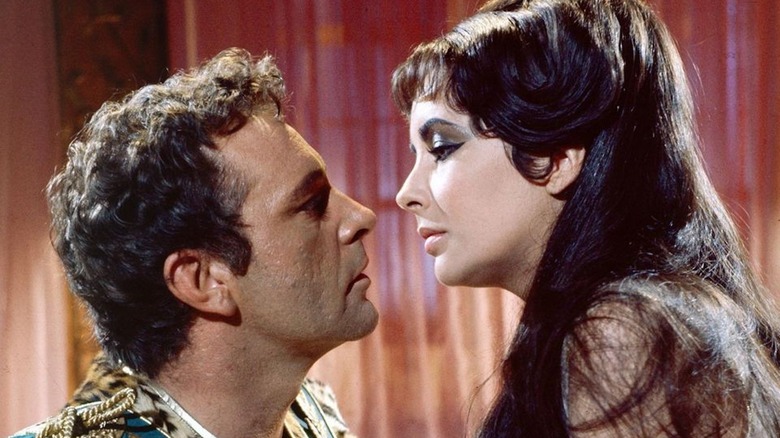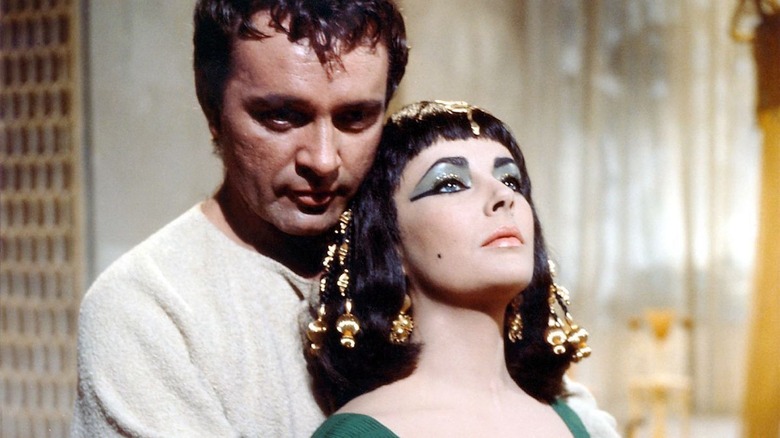A Fox Studios Film From 1962 Is Still One Of The Most Expensive Productions Today
Buddy Adler was just two years into his brief reign as the Head of Production for 20th Century Fox in 1958 when producer Walter Wanger brought him an epic project that could potentially pull the then-struggling studio out of its box office slump. The film wound up soaring so far over budget that Fox would be forced to sell 180 acres of its Los Angeles backlot to Alcoa just to stay financially afloat.
Had Adler made "Cleopatra" on his own terms, the title role would've been a sensibly priced production toplined by one of the studio's affordable contract stars (e.g. Joan Collins or Joanne Woodward). Wanger, however, had outsized dreams. He saw the historical drama as a Hollywood epic for the ages. He believed in its potential to dominate the box office and win scores of Academy Awards. He wanted Elizabeth Taylor, arguably the most popular movie star on the planet, and he convinced Adler to pay her a record $1 million (just shy of $11 million in 2024 dollars) plus 10 percent of the gross. This move would prove incredibly profitable for Taylor, but it put the production behind the eight ball before a frame of footage had been shot.
"Cleopatra" delivered. Partially. It was the highest-grossing movie of 1963 and was nominated for nine Oscars (winning four). But its $31 million budget ($360 million in 2024) all but guaranteed that it wouldn't get into the black during its theatrical run. How did the production spin so wildly out of control? That's what happens when you fire your director 16 weeks into shooting, pause the production for nine months, recast a number of major roles, and unexpectedly court controversy when your two married leads plunge into a torrid love affair.
Here's how it all went down.
A sick Liz and a scapegoated director
Wanger initially approached Alfred Hitchcock to direct "Cleopatra," but settled on Rouben Mamoulian when the Master of Suspense wisely declined. Mamoulian was a stylist capable of working on a large scale, but he'd twice been fired from high-profile productions ("Laura" and "Porgy and Bess") for clashing with producers.
Mamoulian's difficulties during his tenure on "Cleopatra" were not entirely his fault. Taylor was knocked out for several weeks due to meningitis, which forced the director to shoot around her. Ultimately, Taylor's recuperation led Fox to pause the production, at which point Nunnally Johnson was brought in to write a new script. Both Mamoulian and Taylor were displeased with Johnson's work, but the delays had caused budget overruns and, after 16 weeks, left Fox with a mere 10 minutes of usable footage. Fox president Spyros Skouras (who was now fully in charge of the project after Adler succumbed to lung cancer in 1960) had to blame someone, and he chose Mamoulian.
Mamoulian resigned from "Cleopatra" on January 18, 1961, and was replaced by Joseph L. Mankiewicz, a four-time Oscar winner with the dual upside of being a terrific screenwriter and having directed Taylor to a Best Actress nomination in 1959's "Suddenly, Last Summer."
"Cleopatra" finally resumed production on September 25, 1961, with a couple of casting changes, the most notable being Richard Burton taking over the role of Mark Antony from Stephen Boyd. Thus began one of the most tempestuous love affairs in Hollywood history, one that threatened to overwhelm the seriously over-budget film.
Burton and Liz (and Mankiewicz) versus a meddlesome Zanuck
Mankiewicz had completed less than half of his screenplay before principal photography resumed, so he had no choice but to shoot the film in sequence, which meant the studio was paying a number of actors to hang around on the set and wait for their scenes to be finished. This added to the film's budgetary woes. That the script's length suggested a run time of over four hours also irritated the Fox leadership (which switched hands again when longtime top dog Darryl F. Zanuck returned to run the studio).
As for Burton and Taylor falling madly in love (thus ending both of their marriages), this was a massive scandal and a headache for Fox and Mankiewicz. But it was also free publicity. People all over the world were captivated by the affair. Prior to the movie's June 12, 1963 release, Life declared "Cleopatra" to be "The Most Talked About Movie Ever Made." Even if the film didn't live up to its epic hype, moviegoers were still excited to see if that illicit heat carried over to the big screen.
As expected, Mankiewicz's rough cut of "Cleopatra" ran long. Really long. He eventually got the five-hour-and-20-minute assemblage down to four-and-a-half-hours, at which point he asked Zanuck to release the movie in two parts. Given that the Cleo-Antony relationship doesn't heat up until the second half of the film, Zanuck demanded the film be released in full. And when Zanuck realized Mankiewicz was wedded to a four-hour cut, he assigned his own editor to truncate the movie behind the director's back.
Zanuck's actions earned condemnation from Taylor and Burton. How harmoniously this editing room kerfuffle was resolved depends on who's telling the story, but Mankiewicz did get to screen a 244-hour cut for the film's New York City premiere. After this, "Cleopatra" was slashed down to 184 minutes for its U.S. release.
A not-quite-classic Cleopatra
The critical response was positive overall, even rapturous in some quarters (The New York Times' unpredictable Bosley Crowther called it "one of the great epic films of our day"), but Taylor's performance was often singled out as one of the film's weakest elements. Burton took his lumps as well, with his Antony compared unfavorably to Rex Harrison's compelling portrayal of Julius Caesar. The Academy concurred, depriving Taylor and Burton of nominations while recognizing Harrison (who lost Best Actor to Sidney Poitier for "Lilies of the Field").
"Cleopatra" won four Oscars for its impressive craftsmanship (Best Cinematography, Best Art Direction, Best Costume Design and Best Special effects), and, viewed today in its 251-minute cut, that's the reason to watch the movie (along with Harrison's fine performance). Mankiewicz's vision of a character-driven epic was undermined, but would moviegoers have lined up for an epic largely devoid of battle scenes? (The last, as-yet-unrealized studio attempt at a "Cleopatra" film was pitched as a political thriller.)
Zanuck's commercial instincts were spot on and probably went a long way toward making the film profitable (when he sold its television rights to ABC for $5 million). Still, the damage to the studio's acreage had been done. Alcoa turned this land into Century City, a business district with massive hotels and the Westfield Shopping Center. But there's still a Fox presence in Century City. It's the 34-story Fox Plaza, which was built in 1987, just in time for NYPD Detective John McClane and a bunch of Eurotrash thieves to blow it to smithereens on Christmas Eve.



